Travelers Read online
Page 6
Turning away from Grizzy, Cardyn tugs on the sleeve of my tunic. “Kress. What are we getting into here?”
“We’ve faced worse,” I remind him.
“Um. Getting burrowed into by vampire worms? No. I really don’t think we have faced worse.” He starts fiddling with the broken strap on the tomahawk axe he nearly killed me with.
When I flinch, he says, “Oh yeah. Sorry about before. But it wasn’t my fault.” His voice trails off, his eyes fixed on the floor.
I run my fingers along my neck. “Sure. Tell that to my nearly-severed head.”
“Here,” Brohn says, reaching down to the litter scattered around our feet in the dimly-lit hallway. He hands a gnarled stick to Cardyn. “Maybe you should try a weapon more your speed.”
“Very funny,” Cardyn whines, tossing the brittle twig back to the floor.
At the end of the next musty corridor, Grizzy stops and calls our attention to the monstrous vault door built into the wall in front of us.
“Not a good idea ta try ta get inta the city above ground,” she explains as she grips the door’s huge steel wheel and begins to crank it around. “Heat’ll kill ya if th’ Roguers don’t, an’ if none of ‘em get ya, contaminated rain’ll drown ya. Drown or burn. It’s what life’s come down ta ‘roun ‘ere. Life and Death, that is.”
With an exhalation of some very nasty smelling air, the massive door opens to reveal a dark tunnel. A bullet-shaped, bus-sized car sits on a set of dark metal rails. “Power’s rationed by the Fort Knights,” Grizzy tells us. “But we got a generator runnin’ so we can get in on the ol’ Tube.”
Leading the way, she loads us into the vehicle she calls a “train.” Really, it’s an empty shell of steel with an old-style panel of dials, levers, and assorted control buttons at the front. It looks even less capable of movement than the plane we came in on, and, judging from the eye-watering smell, the thing is probably powered by diesel or propane or, maybe by badly decayed animal waste.
We take our seats as Grizzy lumbers up to stand at the controls. She tells us over her shoulder about the wedge-shaped cow-catcher she personally rigged to the front of the rail car.
“Good for clearin’ away debris and the odd Scrounger trying ta pilfer what’s left of the tracks.”
After about half an hour of stomach-churning rattling, the so-called “train” comes to a rude stop with a breathy moan followed by a slightly alarming clank.
Render is fidgety and keeps clamping his claws into my forearm, which he’s apparently decided is the best place to roost while we’ve been jostling along.
With two hands and a deep grunt, Grizzy forces the train’s door open and tells us to “Mind the gap” on our way out.
“This is as far as I can take ya. Whatever it is you’re lookin’ for…let’s just hope it don’t find ya first.”
After giving our thanks and saying our goodbyes to Grizzy, we walk along a concrete platform and up a twisting flight of loose, shifting rubble that, judging by the badly bent brass railings on either side, used to be a flight of stairs.
As soon as we reach the surface, Render launches himself from my arm. Beating his wings with powerful strokes, he’s quickly out of sight, disappearing behind the fractured remnants of a towering, graffiti-filled cinder-block wall.
“Hungry,” I explain to the others.
Not realizing he’s stopped in his tracks, I bump into Brohn. “Sorry.”
“Look.”
I follow to where his finger is pointing. As tragic as this once great city looked from the plane, it’s a million times worse from ground level.
I take an audible breath.
The great city of London, England is an unrecognizable wreck.
10
Ravens
We came across some blighted cities back home, but there’s something eerily worse about this place. Back home, we came across isolated towns with a handful of people clinging to life. We saw some of the New Towns where vigilante justice ruled. And we spent time in Chicago, a city with a few skyscraping towers for the Wealthies, endless rows of rail cars for the poor, and nothing in between.
Of course, we also encountered some pretty nice places like San Francisco and Washington D.C. Well, nice looking, anyway, provided you ignored the ticking-time-bomb presence of the Patriot Army.
London isn’t any of these things. It’s way worse.
Nearly all of the taller buildings are just steel framework and skeletal structures of brick and plaster. Some are nothing but their foundations. Devastated office buildings spill their steel and concrete guts into the roads. I don’t think there’s an intact pane of glass in the entire city.
And, unlike Chicago, which was largely devastated but tragically overpopulated, there doesn’t seem to be anyone living here.
Instead, there are hints of civilization and the remnants of the presence of people.
Enormous construction cranes, most of them bent and tilted at horrifyingly unstable angles, litter the skyline. Whatever construction was being done here was stopped in its tracks.
In the distance, a bridge, broken in half, dips into a dark river from either end of the rubble-filled banks.
Beyond that, there’s another bridge, also smashed in the middle with the remaining halves of the structure sloping to the side and five minutes away from collapsing completely and disappearing forever into the murky water.
An encroaching flood of reddish-brown river water laps halfway up the first floor of many of the intact structures lining what’s left of the road we’re on. We follow Rain up a short flight of steps and down a cavity-filled cobblestone road to avoid the tidepools, which steam and burble under a swirling blanket of pinkish, acidic fog.
Parts of the sidewalks Rain leads us along are buckled to near impassability, and we have to backtrack a few times before getting on our way again.
Dunes of simmering garbage, hot with decay and festering under a thick congestion of millions of tiny black flies, run the length of what’s left of the roads.
Along the way, we keep seeing wooden and steel doors in various states of disrepair. They are all pointlessly closed.
“Why bother with doors?” I wonder out loud. After all, anyone can come and go through any of the partial walls or through the wide-open window frames. And, from what I can tell based on our brief half hour of walking through this hell-on-earth, there’s no one here and nothing for anyone to steal, anyway.
“And what’s with all the ‘Cs’?” Cardyn asks.
Scanning the big white “Cs” painted onto practically every other door and several of the half-walls, Rain shrugs. Terk guesses maybe they’re there to indicate that a house or a shop is closed.
Brohn guesses it stands for “Condemned.”
Accompanying most of the “Cs” is a stenciled picture of a bird in white silhouette—it looks a lot like a raven—standing on a crisscrossed pile of white bones. I don’t know if it was painted by vandals or if it’s a stamp of warning slapped in place by the city. Either way, it’s creepy.
I ask the Auditor what it all means. In the soft, flat voice of failure—slightly muffled now from under Terk’s billowing brown monk’s habit—she admits she has no idea. “I’m scanning the area through Terk’s integrated optic-circuitry. I can see what you’re referring to. Unfortunately, without a network to infiltrate, I’m forced to rely on my existing neuro-tech retention system.”
“I’m sorry,” Cardyn chortles. “Your what?”
Rain scoffs. “Her memory, Dummy.”
“Oh. Why didn’t she just say so?”
“Come on,” Rain urges. “Let’s keep moving.”
Getting through the city to the Tower of London is turning out to be more of a march through Hell than a straightforward stroll through town.
Rounding a corner and stepping into a dark, narrow laneway, we stop in our tracks at the sight of dozens, maybe hundreds, of fat black birds. Some are perched high up on empty window ledges or along jagged tops of fract
ured and half-fallen walls. Others are strutting around on the ground of buckled brick and patchy asphalt, their heads bobbing in a weird rhythm as they peck around for food.
We’re all standing there open-mouthed at the bizarre scene before Cardyn finally breaks the silence.
“Is…one of those…Render?”
I shake my head.
“Those are ravens, though, right?”
I nod.
“A lot of them,” Brohn says.
I nod again. “More than there should be.”
“Why so many—?” Terk starts to ask, but I cut him off and point to one of the clusters of birds, their slick black heads glistening wet as they feed on shadowy lumps heaped against the buildings’ foundations and bulging up in bloated mounds from the gutters.
“It’s bodies,” I half-whisper. “Human bodies. The birds are eating the corpses.”
With his fingertips pressed hard to his lips, Cardyn turns various shades of green.
“Ravens are scavengers,” I remind him as coolly as I can. “They’re doing what they have to do to survive.”
Brohn starts to walk forward. “Aren’t we all?”
We follow him, inching our way down the center of the road, careful about where we step and about how much noise we make. Not that there’s any pressing need for us to be quiet. Any noise we might make will be drowned out by the ravens’ happy, guttural grunts and by the choppy pecking of their rock-hard beaks against their feast of stringy muscle, greasy organs, and splintered bone.
It’s like walking through a graveyard nightmare of voracious demon birds and partially buried bodies.
“I see why it’s call ‘ravenous,’” Cardyn whispers from the back of our solemn, meandering procession.
“That’s not where the word comes from,” the Auditor offers from under Terk’s robe. “The noun ‘ray-ven,’ the thing we know as the bird, comes from Old English. It means ‘black and shiny.’ The verb ‘rah-ven’ comes from Latin and French. It means, ‘to prey upon and devour.’ Etymologically, the two words aren’t related.”
Cardyn doesn’t believe her and asks me if it’s true. Trying to ignore the terrifying setting we’re passing through, I sigh and roll my eyes. In addition to being the raven whisperer and the Kakari Isutse, “the girl who dreams in raven,” I guess now I’m supposed to add the title of resident etymologist.
“How am I supposed to know?” I call back. But then, I remember a passage I once read from Shakespeare. The lines snap fully formed into my head like I’m reading them in a book I just opened.
“‘O serpent heart, hid with a flowering face! Did ever dragon keep so fair a cave? Beautiful tyrant! Fiend angelical! Dove-feather'd raven! Wolvish-ravening lamb! Despised substance of divinest show! Just opposite to what thou justly seem'st, a damned saint, an honourable villain!’”
When I’m greeted with stares, I say, “Sorry. That’s from Romeo and Juliet. Act three, scene two.”
Impressed, Brohn starts to give a long, low whistle that he cuts short when several of the feasting ravens around us perk their heads up and bark at him, annoyed at having their dinner disturbed by the irritating sound.
“I think the Auditor’s right,” I say. “In the passage, the ray-ven has feathers like a dove. The lamb is rah-vening hungry as a wolf. It’s two different words.”
“See?” The Auditor’s voice echoes out. “Two different words. They’re unrelated.”
“Don’t be smug,” Rain calls back. “It’s a bad look for an A.I.”
“She’s not an A.I.,” Brohn and I say at the same time. Normally, we’d probably all have a good laugh, but the vortex of death around us is kind of sucking all the oxygen out of the air.
At the end of the raven-infested laneway, we step out of the shadow of death and onto a wider, quieter road. Rain lets out a loud exhalation, and I realize that I’ve been holding my breath, too.
“This way,” she says, taking the lead.
Behind us now, the ravens continue to grunt, gurgle, clack, and kraa! over their feast, and a shudder runs through my neck and shoulders and down my back.
If my Conspiracy and I don’t succeed, if we don’t make it out of this city alive, could that be us in that alleyway? Will the ravens feed on our dead bodies? And if they do try to eat what’s left of us, which side will Render be on?
11
Little Things
Cardyn gives a half-impressed, half-sad squint at the charred ruins rising up around us. “Wow. All this happened without the Eastern Order.”
“It all happened without any real enemy at all,” Brohn reminds him.
“I wish we could’ve brought War with us,” I say, raising my boot high to avoid stepping on what looks like the moldy remnants of a rodent. “I’d feel a lot safer with someone his size leading the way.”
Cardyn claps one hand on my shoulder and the other on Rain’s. “Who needs a human tank? We’ve got Rain.”
Rain slaps Cardyn’s hand off of her shoulder. “Give me a break.”
“Hey. There’s people up there.” Terk points above us to where fires are burning from a series of rooftops under angled canopies of corrugated steel.
Rain squints up into the hazy, red-hued air. “I think they’re cooking.”
Standing behind her, Terk asks her if she thinks they actually live up there.
“Maybe. It’s probably safer up there than it is down here. You know. Because of predators. The human kind, I mean.”
This seems to discomfort Terk, but Rain tells him not to worry.
As we investigate, scanning the rooftops around us, a few sets of curious eyes peer down at us from over the top edge of one of the nearby three-story buildings. A little girl wearing what looks to be a very dirty bonnet leans over, points in our direction, and says something to the little boy next to her. He turns and whispers something to the little boy next to him.
My hearing has gotten pretty acute over time, especially when I connect with Render, but Render’s not around and the kids are too high up for me to make anything out.
Before I get a chance to try again, I’m greeted with a spray of water to my face. At first, I think maybe the kids threw something down on us, but then I realize it’s just rain.
A mass of angry, purplish-red clouds somersaults through the sky, and pellets of fat droplets start plummeting down.
The water comes slow at first, plinking off the metal shelters. Then it surges, and we all scramble for cover inside what’s left of the lobby of a deserted building down the block. With truck-sized holes in the roof and every floor, it doesn’t offer much shelter. I’m not even sure the ruins are going to remain standing while we’re tucked away underneath.
The rain is warm on my skin but not refreshing like taking a morning shower. More like it’s fighting with the air to see which one of them can make me stickier.
Cardyn sidles up to Terk who’s hunched over with his human arm over his head and his chin tucked deeply down into his chest. “You’re not going to rust on us, are you?”
“That’s a reference to the Wizard of Oz,” the Auditor’s disembodied voice says.
“Ahhh,” Rain sings, slinging her arm around Cardyn’s waist. “That makes you the Scarecrow. Now…if you only had a brain.”
Brohn and I start to laugh, but I get startled by the eyes of someone peering out at us from the darkness.
A girl steps out into the meager light. Shrouded by a congestion of stringy, tangled hair and cloaked in three or four pinned-together dirty brown bath towels, she’s soaking wet and surrounded by three little boys. One by one, they line up in a neat row in front of us and hold out their cupped hands.
“Every little fing ‘elps,” the girl says flatly through a grim smile. She and the kids look like they just crawled out from the depths of an underground burrow. The whites of their eyes seem to be the only clean part about them. Even their teeth are splayed out and gray.
“We don’t have anything,” Rain apologizes, patting her hips where s
he’d normally have deep pockets if she were still in her cargo pants. “We’re kind of lost.”
“Ain’t we all?” The girl gives Rain a snarky glare and thrusts her bony-knuckled hands farther forward.
All we have on us are the few rations Grizzy was able to provide, which is nothing more than a small satchel of protein cubes. Brohn moves like he’s going to give some to the girl and her companions, but I reach out to stop him.
“We’re going to need that,” I say quietly from behind my hand.
“That’s in the future,” he whispers back. “This is now.”
“I know who you are,” the girl says.
Brohn stares at her for a second before shaking his head. “I don’t think so.”
“Uh-huh. ‘Eard ‘awkers was lookin’ fer ya.”
“‘Awkers’?”
Rain elbows Cardyn in the arm. “Hawkers.”
“Oh.”
“I’m sorry,” Brohn tells the girl. “We don’t know what that is.”
“You will.”
“I’m giving them some of our rations,” Brohn says, his voice braced with the defiance of absolute determination. “It’s the humanitarian thing to do. It’s the right thing to do.” I must look like I’m about to contradict him, because he cuts me off with a sharp wave of his hand. “We’ve come as far as we have by giving up something of ourselves for the greater good. Why stop now?”
He kneels down in front of the girl and the little boys who appear—based on their common swarthy skin and eyes as shiny green as a wine bottle—to be her younger brothers. Reaching into the satchel slung across his body, he hands each of them two silver packets of our precious protein cubes.
I’m proud of him for doing this, but a lump rises in my throat anyway. After all, if we run out of rations, who knows what else we’ll manage to find? I flash back to the carrion-consuming ravens we passed and wonder if that really might be us before all this is over. Either eating the dead or else being eaten by the things that eat the dead.

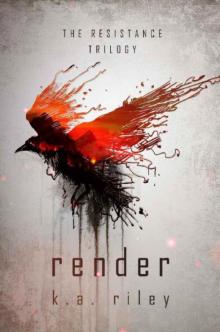 Render
Render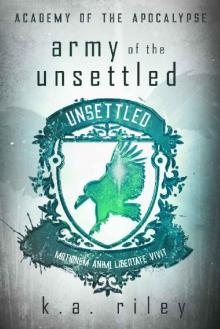 Army of the Unsettled: A Dystopian Novel (Academy of the Apocalypse Book 3)
Army of the Unsettled: A Dystopian Novel (Academy of the Apocalypse Book 3)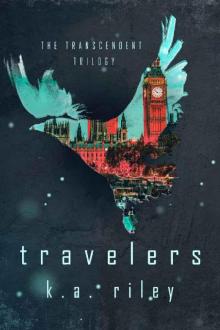 Travelers
Travelers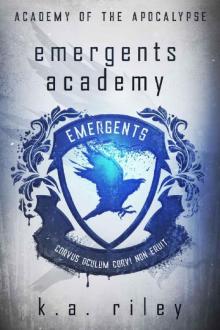 Emergents Academy: A Dystopian Novel (Academy of the Apocalypse Book 1)
Emergents Academy: A Dystopian Novel (Academy of the Apocalypse Book 1)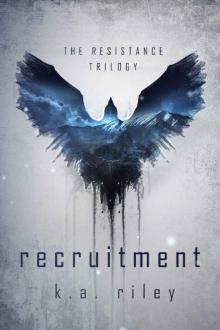 Recruitment
Recruitment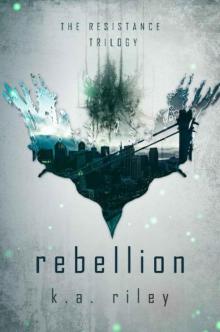 Rebellion
Rebellion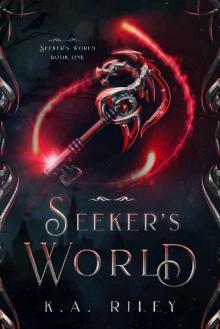 Seeker’s World
Seeker’s World